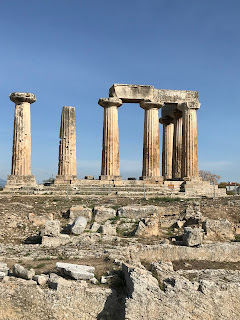This
field trip isn’t flashy like going to Petra or Greece, or even like the
ever-fun “Hezekiah’s
Tunnel.” But I’ve got to say it’s one of my favorites.
Our
first stop was the Wohl Musuem, also known as the Herodian Quarter. This site
really helps us see the conflict between “the chief priests” and Christ. The
people who oppose Christ in Jerusalem are an elite, wealthy group. These ruins show
us how much the wealthy had and how much they had to lose if they were to lose
their standing (see John 11:48). They are also dramatically different from
ruins in villages like Capernaum, showing incredible disparity in living
styles.

The elite who lived here had many luxuries -- mosaic tile floors (with no animal shapes), baths (for both ritual purity and luxury bathing. (like the type of bath we have today). Stone bowls, cups, platters, beautiful dishes. Wall plaster in one home has an engraving of a Menorah, along with perhaps a table of shewbread. These are temple symbols, perhaps reflecting the experiences of the family who lived here. Amphoras show that the families here are importing Roman wine, fish sauce, other luxuries. This shows some really fine dining!
Where do priestly families get such wealth? Tithing, temple taxes, temple economy, — things that Christ may see as a burden on the poor that is enriching elite. This probably is a source of tension.
My favorite part of the museum was the palatial mansion, which is 600 square meters. There is a large open rectangular room. Stucco on the wall is made to look like Herodian blocks — like the temple. The roof (here a reconstruction) shows beautiful stucco designs. People in this home appear to have personal tableware, in contrast to poor people who were sitting around cooking pots dipping in bread.
You can see that there were beautiful frescoes — some that are charred, indicating the Roman destruction in 70 AD.
The layout of this home is similar to what the gospel writers seem to have in mind as they describe Christ’s trial before Caiaphas. As large reception area, and adjacent to it is an open air courtyard. Nobody is arguing that this was the place of Christ’s trial, but it was certainly a place like it, and a place not very far away from that location.
“And Peter followed him afar off, even into the palace of the high priest: and he sat with the servants, and warmed himself at the fire….And some began to spit on him, and to cover his face, and to buffet him, and to say unto him, Prophesy: and the servants did strike him with the palms of their hand.”
At the very moment they are mocking Jesus for not being able to prophesy who hit him, his prophesy about Peter is about to come true:
“But he began to curse and to swear, saying, I know not this man of whom ye speak. And the second time the cock crew. And Peter called to mind the word that Jesus said unto him, Before the cock crow twice, thou shalt deny me thrice. And when he thought thereon, he wept.”
Dr. Grey gave a powerful devotional contrasting Peter’s 3 denials with his 3 affirmations in John 21. We will all fall short, but we can all change and grow.
***
Our second stop was the
Hurva Synagogue (see link for details). It was a beautiful building and fun to walk in this historical space. Lani and I got a picture together with Kayla from the top.
***
My favorite part of this field trip, and one of my top ten favorite places in Jerusalem, was the
Davidson Archeological Park.
We spent time at Robinson’s arch and saw stones from temple thrown from the Mount, down to the street. This reminded us of the Savior’s statement, “See ye not all these things? verily I say unto you, There shall not be left here one stone upon another, that shall not be thrown down” (Matthew 24:2).
Dr. Grey pointed out the trumpeting inscription and cited Josephus as stating that the “Pinnacle” of the temple would likely have been in this area (the southwest corner of the temple). We looked at stores where things were sold and discussed the temple economy. This type of economic activity is also happening in the royal stoa area, where Christ would have cleansed the temple.
Finally we went to the southern steps that led up to the temple in the time of Christ. These stairs are Herodian, some of the originals are still there. We read John 8:56 – John 9:7 and discussed how Christ may have passed the blind man while heading down these steps.
Neil Armstrong, the first man to walk on the moon was a devout Christian. He visited Israel in 1988 and asked his guide to take him to a place where it was certain Jesus had walked. The guide took Armstrong to these stairs (including the worn stone at base of Double Gates) and said Jesus was an observant Jew and this is where Jews entered/exited the temple. He concluded: “Jesus stood on these steps, of that we are certain.” Armstrong prayed silently and then said: “It means more to me to stand here than to stand on the moon.”

































